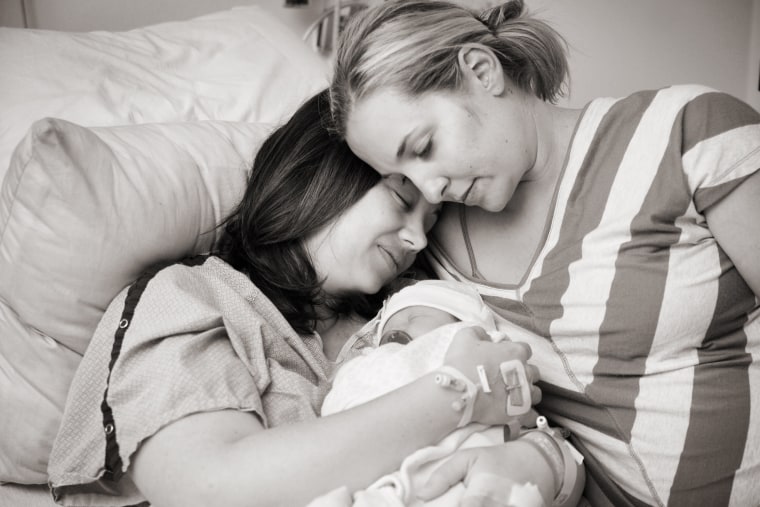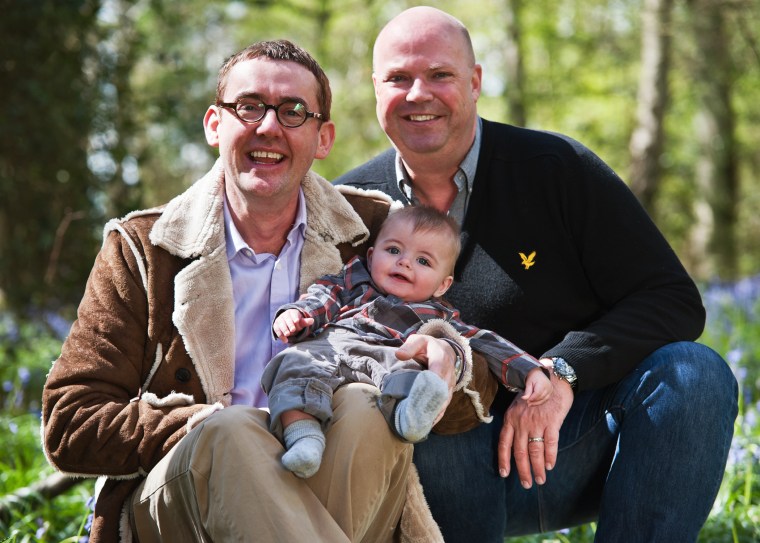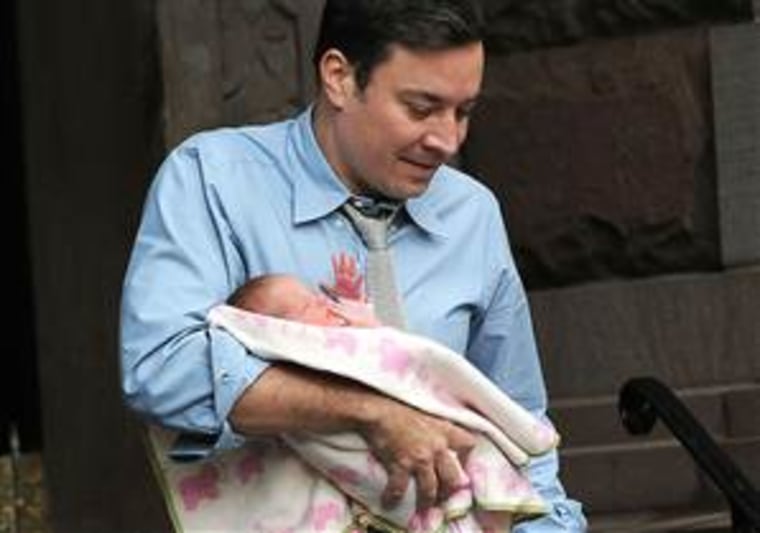In late July, Jimmy Fallon surprised his fans by announcing that he and his wife, Nancy Juvonen, had a brand new baby girl. Now, Fallon has revealed a second baby surprise: daughter Winnie Rose Fallon is here thanks to a surrogate.
"My wife and I had been trying a while to have a baby," Fallon told TODAY’s Savannah Guthrie. "We tried a bunch of things – so we had a surrogate."
More couples, and not just celebrities, are turning to surrogacy to start or grow their families, according to recent statistics. In particular, gestational surrogacy – that is, when the surrogate mother is not genetically related to the baby she is carrying -- is becoming more common in the U.S.
Statistics from the American Society for Reproductive Medicine show that births via gestational surrogacy have been steadily increasing since 2004. In 2011, there were 1,593 babies born via gestational surrogacy – that’s up from 1,448 in 2010 and 738 in 2004, according to the latest figures from the Birmingham, Ala.-based non-profit.
And thanks in part to high-profile types like Fallon casually announcing that he and his wife used a surrogate, the method is becoming much more accepted, and less stigmatized, in the United States, say experts and couples who have been there themselves.
Heather and James Gwinup even included their surrogate -- who is Heather's best friend -- in photos announcing they were expecting: In one, a pregnant Jennifer Irwin holds a sign saying, "Their bun. My oven."
While Gwinup had successfully carried one pregnancy to term, she'd also suffered five miscarriages, and had had multiple surgeries for endometriosis, ovarian cysts and polyps. Irwin offered to be a surrogate for the couple the day she accompanied her friend to a doctor's appointment where they learned she likely wouldn't be able to have another baby.
"And I didn't think, I just said, 'Well, I could do that. I could totally do that,'" Irwin says.
Gwinup remembers the moment so well that she can even recall the exact road she was driving on when her best friend made the incredible offer.
"It was the first time that something was easy in our fertility journey," Gwinup says. "I kind of laughed. I had spent so much time trying to have a second child and to have someone offer that gift to me was just kind of unbelievable."
Just the week before, Irwin and her husband, Bryan, had discussed her becoming a surrogate. She'd breezed through her own pregnancy and after giving birth to twin boys, joined a support group for parents of twins, where she found that not everyone had had it so easy.

"It seemed so unfair. Just so unfair," she remembers thinking at the time. "It just seemed like we could do more to help these wonderful families."
So when it turned out that it was her best friend who needed the surrogate, Irwin says the decision felt very natural. She was given a series of health tests to see whether she'd be a good candidate, which she passed easily. Five months later, in September of 2011, Irwin was pregnant, and she gave birth to Hadley in May of 2012.
All told, the surrogacy cost the Gwinups around $50,000, including the fees they paid Irwin. But the costs can climb much higher, putting the option out of the reach of many. Couples are usually advised to prepare to spend as much as $75,000 to $120,000 once the whole thing is said and done.
The high cost can be daunting, says Ian Donoghue, whose son Albert was born via surrogate in 2011.
According to estimates from New York Fertility Services, which Ian Donoghue and his partner Olaf Donoghue used, the cost for medical care itself starts at around $17,000 to $20,000. Add the agency fees, background checks, legal fees and surrogate fees like living expenses or reimbursement for maternity clothes, and surrogacy can cost the intended parents up to $100,000 -- and add another $10,000 to that if it's twins.
Ian Donoghue said he long considered surrogacy to be a "red-carpet privilege" -- something for celebrities like Fallon, or other well-known couples like Sarah Jessica Parker and Matthew Broderick, or Giuliana and Bill Rancic -- so for years, he never seriously considered pursuing the idea.

Currently, 15 states have laws requiring insurance coverage for infertility treatment, according to the National Infertility Association. But many insurance companies consider surrogacy "a risk they are unwilling to undertake," according to New Life Agency, a California-based insurance agency that specializes in assisted reproductive-related needs.
The Donoghues did end up spending about $100,000 when all was said and done in order to bring baby Albert home to London, where the family lives. Ian Donoghue said that between the two of them, they had about half that amount in savings, and they took loans out to cover the rest. Paying that back is "going to trickle on for a number of years," says Donoghue, who, along with Olaf, is a health-care professional. "But some people spend that kind of money on a car."
Gwinup says the gift her friend gave her is priceless. "No amount of money would ever compensate Jen for what she's done for our family," she said. "That's something that can't even really be articulated, let alone (calculated) into a number."
Irwin said that while being a surrogate had challenges, she'd do it again -- for the Gwinups, that is.
"People always ask me if it was hard to give Hadley up after carrying her for nine months," Irwin says. "No, it wasn't hard. She was never mine. I was just able to borrow her for a couple of months. And then I was giving her back."
